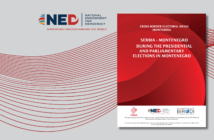The present analysis of the Law on Prevention of Corruption was commissioned by the NGO Mreža za Afirmaciju Neprofitnog Sektora (MANS) within the framework of the project “Fighting Conflict of Interest and Unexplained Wealth of Public Officials.”

The Law on Prevention of Corruption (LPC) is but one segment of the Montenegrin anti-corruption system. It establishes the Agency for Prevention of Corruption. It lays down common conflict of interest-related obligations and restrictions (incompatible functions, gifts, assets declarations) for a set of higher level officials working or acting in the public sector. It also addresses corruption risk management systems in public institutions (“Integrity Plans”) and elements of whistle blower protection for corruption-related “threats to the public interest”.
As the law does not seek to regulate all anti-corruption thematic policy areas; for instance, rules on lobbying or political party and campaign finance, etc., are to be found in other legislation. More problematically, however, it addresses only partially the select policy areas which is does attempt to regulate, most notably, the conflict of interest regime, which is the focus of this analysis.
This report nevertheless reviews all the provisions of the LPC to some extent. It aims to consolidate existing analyses and offer additional insights and recommendations on a way forward. It is organized to broadly follow the sequence of issues laid out in the law, but it also endeavors to address discernable thematic wholes—the distinct anti-corruption regimes and institutions addressed by the law.
You can read complete report here.



